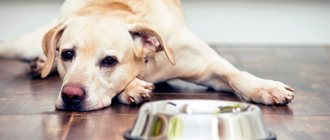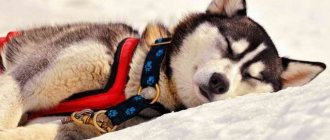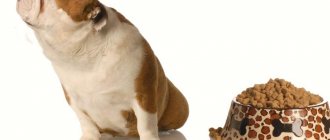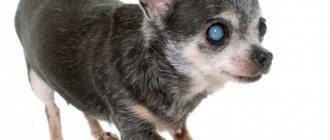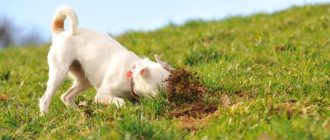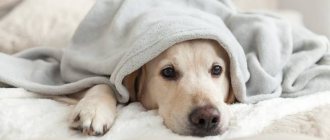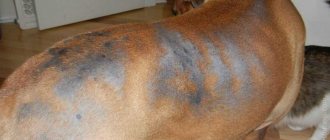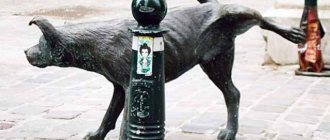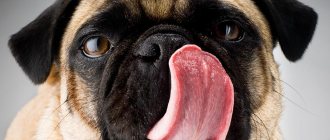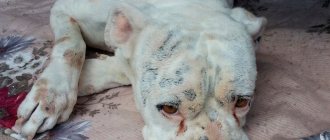There can be many reasons why a dog refuses to eat. Fatigue, fear, slight illness or serious illness. You cannot force a dog to eat. We must first find out the reason for this behavior.
The dog refuses food and water, lethargic, drinks a lot, trembles, dry nose causes and what to do and what it could be
When a dog is in pain, he most often refuses to eat. It is necessary to take a close look at the animal to understand the reason. If there are no obvious signs of disease, you need to go to a veterinary clinic for examination.
Refusal to eat, dry nose and trembling are the beginning of a disease that is always easier to treat in the early stages. Great thirst in dogs with gastritis or stomach ulcers.
Why does the dog refuse to eat and lose a lot of weight? It hides, but is cheerful and active.
A dog can sometimes arrange a fasting day for itself, if it is cheerful and active and the hunger strike does not last long, there is no reason for concern.
Prolonged refusal of food, severe emaciation clearly indicate a disease in the dog. The cause may also be nervous stress, which also requires veterinary care and treatment.
The dog refuses to eat, vomits bile, foam, eats only raw meat
If a dog refuses to eat and vomits, it could be poisoned. Vomiting can also be caused by a concussion in a dog if it hits its head hard. The cause may be gastritis or a disease of the internal organs. Some infectious diseases also cause fever and vomiting.
Only a veterinarian can determine the true cause of the disease after examining the animal. A penchant for raw meat can cause helminth disease, which in turn will cause the pet to refuse food, lose weight, and feel unwell.
The dog refuses to eat during estrus, pregnancy, sleeps all the time, after childbirth, surgery
When a dog refuses to eat during pregnancy, it may have toxicosis. You should not force your dog to eat, as this may cause vomiting. Long-term refusal to eat threatens not only the animal, but also the offspring. Therefore, the dog must be shown to a veterinarian. He will prescribe sorbents that will reduce toxicosis.
If a dog sleeps all the time after surgery, childbirth, or during heat, it may simply be recuperating. If the doctor, after examining the dog, does not find any disease in it, do not force the animal to eat. Having gained strength, the dog will begin to eat on its own. Try changing the food, maybe the dog will appreciate a more tasty treat and stop the hunger strike faster.
The dog refuses food from its new owners, it has gastritis, how to avoid exhaustion and feed it
When a dog refuses food from new owners, this is a normal temporary phenomenon. With a good attitude, the dog will soon begin to eat and come to terms with his situation.
If a dog has gastritis, it needs to be treated. Gastritis very easily turns into an ulcer - a deadly disease. If the pet refuses food for a long time, it is necessary to receive IV drips at a veterinary clinic. You can't force feed.
The dog refuses food for more than a week than fed, the urine is dark, with blood, diarrhea
If a dog does not eat for more than a week, it can be fatal. She urgently needs veterinary care, proper treatment, and IV drips.
The dog refuses to eat in the morning, his stomach growls, his stomach is swollen, his temperature is normal
All puppies and dogs would benefit from taking a bath, but this must be done promptly and correctly, otherwise unpleasant health problems may arise...
A pet's poor appetite can cause a lot of anxiety for the owner. If your dog begins to eat poorly, you should not be indifferent to it - there may be serious reasons for this. Pay close attention to your pet’s condition and use the advice in this article. So what should you do if your dog is not eating well?
Try to determine the cause
Remember that there can be many reasons for refusing to eat. First of all, pay attention to the health of your pet - after all, this is the most important thing.
You should not assume that a dog can only eat poorly if it has helminths - perhaps the reason is completely different and, in order to exclude the possibility of a serious illness, it is best to take your pet for an examination to a veterinarian and, if possible, carry out a series of tests.
Remember that a bitch’s appetite may worsen if she is in heat, but this is a natural process, not a disease, and it does not imply any changes in the pet’s life or menu.
Professional feed
There is nothing easier than feeding your Husky dry food at home. In this case, you need to pay attention only to the manufacturer and the brand itself. Some of them offer specialized food specifically for this breed. Their main difference from universal ones is that they contain a lot of fat and few carbohydrates. Immediately give up cheap economy-class food. They are mostly low in calories and contain little meat. Most of the flavoring additives in their composition are of non-natural origin.
Therefore, if you are thinking about what to feed your husky at home, and are considering professional food as an option, then pay attention to the shelves with premium and super-premium food. It is best to buy them in professional stores, where consultants will help you make the right choice.
Develop a rational menu
Another possibility of poor appetite in a dog is poor nutrition. To begin with, you must correctly determine the amount of its daily diet - it should be 2 - 3% of the dog’s total weight (subject to eating natural products). The daily food intake is usually divided into two parts and given to the dog in the morning and evening. If your pet does not eat its quota, you should find out the reason for its poor appetite. At the same time, it is forbidden to give the dog any treats or indulge in the wrong food. Try to assess her physical condition and observe her behavior. If your dog becomes lethargic, inactive, has a dry nose, diarrhea, chills, vomiting or any other alarming symptoms, contact a veterinary clinic immediately.
Although remember that there is always the possibility that your dog may just be a picky eater. In this case, the dog’s activity most often remains at the usual level and the mood does not worsen. Do not indulge your pet’s whims; you must understand that by giving him food that is forbidden, you are thereby worsening his health and are not pampering him in any way. Always balance the benefits and harms of your actions. If the dog is healthy and is simply capricious, not wanting to eat the foods you offer, you should do the following:
- Check your pet's diet to ensure it has all the ingredients, vitamins and minerals it needs. Remember that your dog's food should not only be edible, but also contain all the nutrients necessary for his growth and development. Also, take into account your pet's taste preferences.
- You can change the diet - maybe it’s just not suitable for your pet’s taste preferences. To do this, it is possible to change the grains included in the porridge or mix several different ones - experiment, there is a possibility that the dog simply does not have enough useful substances contained in a different type of grain. Make your pet's diet more varied. Alternate fish with meat, fresh and raw vegetables.
- Check the foods you include in your pet's diet. Perhaps some of them are of poor quality or are generally unacceptable for feeding a dog.
- Try skipping one or even two feedings - this is the most effective way to restore your dog's former appetite. Don't allow her any snacks or treats during the day. Give her the food she usually eats, do not change her usual diet, unless, of course, it is correct and balanced.
- Try to identify and eliminate the ingredient that is unpleasant for your pet (this often occurs when feeding multi-ingredient food).
Mixed diet
You need to decide what to feed your husky right away, on the first day your pet is at home, or even better, in advance. Mixed food is absolutely not suitable for this breed (this is when you use natural products, and in the absence of a ready-made dinner, pour dry food into a bowl). In this case, you will definitely not end up with problems with the digestive organs.
The dog’s mood and well-being, as well as its appearance, depend on proper feeding. The only weak point of this breed is its stomach, it is very sensitive. Therefore, her diet is not quite the same as that of representatives of other breeds.
Before you consider in detail what to feed your husky puppy, it’s a good idea to immediately draw up a diagram for yourself of what exactly you can give him. We'll talk about professional food a little later, because with them everything is much simpler; you just need to take a proven brand from a reliable manufacturer. It is much more difficult if you decide to create a diet yourself, from ordinary products.
First of all, remember that the food of these fluffy beauties should contain a lot of protein and fat. In addition, food must be very fresh. Let's look at the main components:
- Meat should make up at least 70% of the diet. Moreover, you can use absolutely anything, and it is best to give it raw. But offal must be cooked.
- Fish is another important dietary component. Dogs need a source of phosphorus and iodine just as much as cats. Sea fish is best. Puppies should be given it cooked, but an adult dog can be treated raw. Remember to remove the bones, so the best thing you can do is cook the mince.
- Sources of fiber are, of course, vegetables. When talking about what to feed a husky puppy, you need to give this point one of the most important places. At least 25% of the diet should be vegetables. Moreover, some of them should be eaten raw. These are carrots and beets, cucumber.
- Cereals also play an important role. It is recommended to consume porridge in small quantities, brewing it with boiling water in the evening. This way they will retain the maximum amount of nutrients and nutrients.
- Kefir or cottage cheese are acceptable several times a week.
When talking about what to feed huskies at home, I would like to add that it is necessary to add vitamins and minerals to the diet. But prohibited foods that should never appear on the menu include smoked foods, pickles and sweets, citrus fruits and potatoes, pumpkin and legumes, cabbage. If they are overused, the Husky's kidneys may fail and severe stomach damage may develop. You should also not give them stale or frozen food.
Increase physical activity
If the dog is healthy, cheerful and still refuses to eat, perhaps it lacks physical activity - try increasing the time or number of walks.
A good, active walk must be supplemented with special physical exercises for dogs. Use your pet's favorite toys, practice commands, stimulate him to be more active - make him run, jump more, and in warm weather - you can take a swim.
After arriving home, after half an hour - an hour, offer your pet its usual food. In most cases, physical activity works up an appetite, and the dog eats with pleasure. Remember that in this case you should not significantly increase the amount of food she eats.
Do not exclude the presence of psychological reasons and the influence of external negative factors
Remember that a dog is also an individual with his own habits, character, and desires. The reason for poor appetite may lie precisely in this. Perhaps your pet is offended by you and by refusing food is trying to show you the depth of his feelings. Also, any emotional shock can affect your dog’s condition. Maybe she's just missing one of her family members. Or some changes have recently occurred in her life that caused stress - this could be moving to a new apartment or family, exclusion of any affection, and similar situations.
The dog can also react negatively to external factors - most often heat. Many dogs' appetite deteriorates at elevated air temperatures - in this case, give it more water and do not walk in the sun a lot.
If there are any changes in your dog's behavior, including loss of appetite, contact your veterinarian, he will examine your pet and give advice.
“What to do if your dog doesn’t eat”
is one of the most frequently asked questions by dog owners.
Deterioration or complete loss of appetite can be caused by a variety of health problems, including simple indigestion. The causes of loss of appetite in dogs
can be psychological and physiological problems.
Lethargy and drinking too much
Any inadequate condition of the dog is a sign of pain. Be wary if the dog lies down a lot, does not allow himself to be petted, or is apathetic towards the offer of a walk. The pain will not go away on its own. If, with the described symptoms, copious absorption of fluid is added, the conclusion arises about a serious disruption of the pet’s body.
Lethargy also appears to be a result of exhaustion. As written in the question, Alabai began to eat less often and is able to give up food completely. You need to find out the reason for refusing food. If there is a whim and a desire to wait for a “sweet” piece, reducing the portion and frequency of food will cure the ailment in a couple of days. Unusual eating behavior of a dog is an indicator of metabolic disorders. It is worth doing a biochemical blood test to determine the pathology of the internal organs.
The dog drinks a lot in case of elevated temperature or fever. Analyze urination frequency. Try to measure your body temperature. If alienation and reluctance to be seen are added, be sure to consult a doctor. Recording the amount of water your pet drinks per day will help in making a diagnosis.
Ultrasound examination of the abdominal cavity and x-rays are added as additional diagnostics. It is important to find out the cause, then begin treatment. Choosing the path of reducing symptoms complicates the process of making a correct diagnosis. It is recommended not to fight the symptoms, but to go to the clinic or call a doctor at home.
Psychological problems
Let's look at possible psychological reasons why a dog may stop eating:
- Anxiety
is the most common problem. Because of it, dogs often refuse food. A dog's anxiety can be caused by a number of reasons, the most common of which is separation from the owner during his temporary departure, for example. Some dogs become anxious when they hear loud volleys (thunderstorms, fireworks, etc.). That's why you shouldn't sound the alarm if after you and your dog are caught in a thunderstorm, she refuses to eat. This state of the animal will soon return to normal! - Depression
is another common reason why a pet may refuse to eat. During depression, a dog feels depressed and depressed. Depression can be caused by many factors. Very often, dogs fall into this state when they change their place of residence, or when they are separated from their owner or another family member. The cause may also be a chemical imbalance in the animal's body. If your dog is depressed for a long period of time, you should definitely consult a veterinarian. - Sexual activity
- this, oddly enough, can also be a reason, but more precisely, this reason may not be activity, but just the opposite, passivity! If a dog, a male, has not realized its natural instinct to reproduce for a long time, then its life rhythm may be disrupted. In particular, he may be less active, refuse walks and games, and completely or partially refuse to eat. As a rule, all symptoms disappear immediately after the “gentleman” reaches his goal and falls into the bosom of the “chosen one”.
Causes of poor appetite
Usually, first of all, owners are concerned about the health of the ward. Indeed, sometimes the cause of poor appetite is a disease. There are a lot of “suspects” here: intestinal obstruction, volvulus, all kinds of gastrointestinal lesions, infections... However, often everything is much simpler.
Most often this is a domestic reason. For example, your puppy will eat less if you play less often. The dog does not need excess energy, so it refuses the additional portion. Also, proper nutrition is hampered by the lack of a clear routine. With chaotic feedings, the puppy is either too hungry or does not have time to get hungry.
A slight decrease in appetite after vaccination is a normal reaction. Usually the drugs are a weakened but live virus. The body has to fight it to develop immunity. All efforts are devoted to destroying the invaders, so the puppy simply has no time to eat. You should carefully monitor the baby. If he doesn't eat at all for more than a day, contact your veterinarian. It is important not to miss the appearance of other alarming symptoms.
If we talk about health-related problems, new owners most often encounter volvulus and obstruction. The first is associated with physical activity after a hearty lunch. It is enough just to correctly draw up a feeding and play schedule to avoid trouble. Obstruction can occur due to the consumption of inedible objects: bones, toy fillers, foam rubber, etc. Pathological causes are accompanied by additional symptoms. Vomiting and weakness often occur, and there is a lack of bowel movements.
Whims are a separate controversial problem. Often, puppies refuse food if they know that the owner will try to persuade them in every possible way and offer something more tasty. Typically, this behavior occurs after fasting for another reason. For example, the baby refused lunch because he was not hungry. The owner added some cheese and started spoon-feeding her. Next time the ward will want to repeat it in order to get a treat and attention, despite the hunger.
Physiological problems
The reasons why a dog may stop eating may include problems such as:
- Stomach upset
, various types
of oral injuries, dental problems
. In such cases, the animal is offered soft food that is easily digestible. Naturally, it would not be superfluous to consult with a specialist. - Indigestion
. A sudden loss of appetite may be a sign of a more serious problem. For example, if your dog likes to climb into garbage cans, then the cause of a deterioration in appetite, or lack of it, may be the dog eating stale food from the trash can. In this case, refusal to eat is associated with poisoning or intestinal obstruction. This is exactly the case when it is necessary to urgently consult a doctor; delay in treatment can even lead to death. - Underlying health problems
are serious conditions for appetite problems.
In particular, loss of appetite is associated with problems with the thyroid gland, heart and lung diseases, and sometimes this can even be caused by cancer. It is worth remembering that in the early stages it is very difficult to notice the occurrence of health problems, which is why if the dog refuses to eat
, you should immediately show the animal to a doctor.
Feeding tips
What to do if the puppy begins to eat poorly, but no health problems are noticed. Try a few tricks. For example, skip one meal and then give the same food. Perhaps the pet was simply spoiled. Remember: the food you give your dog must be fresh. Her diet must be balanced.
Doesn't eat at all or doesn't eat enough? You also need to pay attention to this. Perhaps you just give a lot of food, the portions are large, and the puppy is not able to handle them.
Another trick is a long and active walk. A dog that has spent a lot of time moving and playing must develop a good appetite.
Try changing the diet a little and giving some other foods if the puppy refuses the usual ones. You can also give him a few pieces of salted fish before eating, which should affect his appetite.
It happens that a dog refuses food not because of health problems. Both small puppies a few months old and older individuals tolerate heat very poorly. Babies don’t eat because of problems with their teeth—more precisely, with their teething. What to do in this case? Try feeding your pet soft food.
In addition, the animal's eating habits may change. Because of this, it will refuse the old habitual food.
What to do if your dog has lost his appetite
If your dog appears fairly healthy and has no other health problems, then the following is necessary:
- Watch the dog, maybe it ate something on the street, maybe by the next meal the animal will have an appetite.
- Try heating the food, sometimes picky dogs really like warm food.
- Try not feeding your dog for about 12-24 hours. Give the animal a chance to get hungry.
- Provide your dog with 24/7 access to fresh water.
- Always make sure your dog doesn't eat while walking outside.
How to restore your dog's appetite
What to do if your family pet doesn't eat? The actions of the owners will depend on the circumstances that caused the nutrition problems. In case of stress, the animal needs to be given attention, play with it, walk it more often, and pet it. Positive emotions will quickly return him to a good mood.
In hot conditions, constant access to fresh water must be provided. There is no need to force anyone to eat. Food should be offered at cooler times of the day: morning or evening. You should also not take your dog for a walk in the heat, as this can result in heat stroke and a significant deterioration in his health.
The most important thing is to regulate your diet. If there are no obvious reasons for a hunger strike, then you can not feed the dog for 24 hours. A fasting day will only benefit her. It is necessary to develop the habit of eating at the same time. For example, switch to two meals a day, morning and evening. If the dog has not eaten a portion or has completely refused to eat, the food is put in the refrigerator until the next meal (the food must be heated before feeding).
Important! You should not give your pet a treat if it refuses to eat regular food. Moreover, feed from hands or from the table. This way you can only kill your appetite and instill the habit of “taking bites”.
It is also useful to increase the duration of your walks. Physical activity helps increase appetite. You should walk your dog at least twice a day, take it out for a run in the park or in a safe open place, on a dog run.
When to be concerned if your dog isn't eating
Many dogs can skip feedings quite often, and sometimes even two!
If your dog has missed two to three feedings, or the break in feeding is more than 36 hours, call your veterinarian! It is also necessary to immediately consult a doctor if you have other symptoms: fever, constipation, diarrhea, vomiting, refusal of water, obvious manifestation of causeless pain. Nobody knows your dog like you! If you know that your pet is picky about food, then you should not run to the doctor at the first refusal of food. Remember that only sincere love and attention to your pet is the guarantee that your dog will never have reasons that lead to loss of appetite! Consider all of the above, and your pet will not have problems with nutrition.
Let's consider a situation where the dog doesn't eat, because it often happens that it's time for dinner, and your girl or boy turns his face away from the usual, quite appetizing food.
Friends, in such cases, if the dog does not eat, several options are possible. The most dangerous is illness, that is, she feels bad, has a high temperature, and doesn’t want anything. A similar situation occurs with us when we have a cold or the flu.
How to understand that refusal to eat is due to illness
During the inspection, you can find a lot of interesting things, for example, you will find a tick, a splinter between your fingers, an unpleasant odor from the mouth, or something else.
After the examination, if you find anything, then act according to the circumstances, but of course it is better to consult a doctor, because when a dog does not eat and there is a reason, this is serious.
And when the dog is cheerful, looks good, behaves as usual and does not eat, then do not worry and read on what to do.
Why might a dog not eat?
There can be a lot of reasons for this, the most common is the incorrect behavior of the owner. What happens when a dog refuses to eat? That's right, we persuade her, offer her something tasty. But the dog is not stupid, it immediately catches the connection - don’t eat and the kind owner will give you something tasty. That is, a conditioned reflex is established, which is then difficult to eliminate.
An incorrect feeding regime leads to the fact that the dog does not eat, because for many, food is constantly standing and waiting in the wings, often in a large assortment. There may be cottage cheese in one bowl, porridge in another, and next to it a piece of meat or sausage. The animal understands that there is always food, it walks and snacks. By the way, snacking also has a bad effect on appetite, much like candy does for children.
Also, the dog does not eat if an attractive person of the opposite sex appears in the neighborhood, of course I’m exaggerating, but a female in heat can reduce a male’s appetite for several days.
There may be other reasons for refusing to eat; they need to be found and eliminated. For example, a puppy was beaten with a broom for dirtying the carpets, and then they forgot about it and put the broom near the bowl. As a result, the animal is afraid to eat. There are many such cases; you need to observe the animal and try to understand what’s going on.
And also, friends, don’t worry, an adult dog won’t die of hunger, it can easily go without eating anything for a week without harm to its health. There is an exception, in case of some diseases you cannot fast, but the owner should know about these nuances without my article if he has a sick dog.
What to do?
The age-old question. If the dog is not eating and looks good as usual, then do nothing. Just put the food away until the next feeding. In this mode, you need to feed her - they offered food, refused, wait 5-10 minutes and take it away, no snacks between breaks, with the exception of rewards during training.
You must be strict with nutrition, you must be the master of the food, and feed when you need, and not when the dog wants. Of course, use your power within reason.
There is no need to pour vodka or wine for an appetite, as some do, it is better to take a longer walk, with good physical activity.
But if the dog does not want to eat and you see that something is wrong, then, as I said, conduct an examination, measure the temperature and, if you suspect an illness, go to the doctor.
Friends, what do you do when your dog doesn’t want to eat? Do you force her or persuade her? Write in the comments, I will be interested to know.
Here's a video on what to do if your dog doesn't want to eat, enjoy watching.
If there is a problem with a pet dog starting to refuse food, then every owner should try to understand what the problem may be. It is worth trying to identify the reasons why such difficulty in feeding the animal may have occurred. Best of all, if you don’t want to eat food for more than a day, you should take it to a specialist and ask him questions regarding why the dog refuses to eat. A professional will be able to make the correct diagnosis and prescribe treatment options that will help restore the animal’s health and appetite.
Reasons for hunger strike
If the question arises why the dog does not eat, it is worth understanding the problems that may be hidden behind a simple refusal to eat. The most common psychological factors:
- Resentment. If you had to leave the animal alone for some time, which is unusual for the usual daily routine, then it may well be sad and because of this refuse food after the owners return.
- Stress. If there was a need to transport the animal to another habitat, or simply spend a long time in transport, a temporary loss of appetite may occur due to fatigue and nerves.
- Loud noise. If there is a sharp and bright noise, the dog may become very frightened and completely refuse all the treats offered. It is worth quickly taking her away from the place that causes horror and calming her down.
- When there is a female dog in heat near a male dog, the possible outcome for several days is that the dog does not eat anything. At such a moment, the basic instinct awakens, which overshadows the basic needs of the body. This problem should go away on its own within a few days.
These reasons are easy enough to remove and make the dog enjoy life. It is worth spending more time with her, constantly playing and showing love. When the animal feels safe and is sure that nothing terrible is in store for it, it will be able to calm down and return to its usual daily routine and dietary standards. If she begins to refuse food, but this is not associated with any stressful situations, then the dog may have health problems. The main variants of diseases are:
- Stomach problems. If your dog is not eating anything, this may indicate that he may have an upset stomach.
- Sick teeth. When an animal begins to eat, but quickly spits out food, problems with the jaw or a separate canine are possible.
- Worms. They interfere with healthy digestion of food, causing the dog to not eat or drink anything, which causes him even more discomfort.
- Difficulties in the functioning of the heart. Due to general malaise, the animal loses its appetite.
It is definitely worth monitoring the dog’s condition; if suddenly other additional factors and symptoms are added to the refusal to eat, you should contact a veterinarian as soon as possible.
Husky is kind, there are no exceptions
Husky is kind. Kind to everyone, no exceptions. Counting on him to protect you from gopniks on the street is stupid and pointless. You can ask the bully to hold the leash and immediately run. He won't have time to let go of the rope, and his shoulder will be dislocated. An adult strong male takes off like a ’69 Dodge charger. Wool is the seasoning for every dish on your table. She's everywhere. It seems that the dog shaves at night while everyone is sleeping. Clean every day, twice a day, all to no avail, the dog will pick up more.
Symptoms
If affection and calming the animal do not bring results, and the dog continues to refuse food, you should think about possible health problems. Some additional symptoms may indicate difficulties and various ailments:
You should not delay a trip to the veterinarian if such symptoms are added to your refusal to eat. Most likely, the animal is suffering and needs emergency help. After all, how much a dog may not eat is directly related to how much other problems expand and consume its body.
Without loss of health, this period is only 2 days, and then even more detrimental effects on the animal will begin.
Diagnosis of the disease
If the dog suddenly refuses food and water, and no external environmental factors have been found to influence this, the veterinarian will make a diagnosis after conducting several tests and laboratory studies.
- Ultrasonography. Based on this procedure, a specialist will be able to identify problems associated with the functioning of internal organs.
- General blood analysis. It will show whether there are inflammatory reactions.
- X-ray. This test will help determine the presence of internal fractures, tumors, and enlargement of the heart muscle.
- Adrenocorticotropic hormone testing. ACTH tests can indicate how well a dog's adrenal glands are working.
- Endoscopy. During general anesthesia, a device will be inserted into the animal that will show the professional the possible visual internal injuries to the dog.
After passing all the tests prescribed by the attending physician, he will be able to accurately determine the diagnosis, on the basis of which he will select the optimal course of pills and other medications to restore health to his beloved pet.
Treatment and drugs
After understanding what reasons caused the animal to go hungry, you need to find out what to do if the dog does not eat. The doctor prescribes medications that can most quickly cure a sick animal. Depending on the diagnosis, several courses of tablets are prescribed. These may be anthelmintic, immunostimulating or bowel-improving medications.
Anthelmintic
Helminths can remain in the dog’s body all the time and not show up. But if the animal exhibits symptoms, then the following medications should be taken:
When taking any drug, you should monitor the general condition of the animal to prevent poisoning and intoxication of the dog.
Immunostimulating
If a dog is diagnosed with a viral infection, then it is necessary to take drugs that increase immunity, since antibiotics do not always bring the desired effect.
Fosprenil. It is mainly prescribed by injection. It is of little danger to the animal and has a strong antiviral and restorative effect.
- ASD - 2. The dog should drink this solution along with regular water. Sometimes, the liquid is mixed with food. It is used for many diseases of the internal organs of animals and malfunctions of body systems.
- You should not constantly give your dog immunity-boosting drugs, as over time, addiction may occur, and at the time when the action is necessary, the treatment may not work.
Bowel preparations
Surprisingly, the most common medication prescribed by veterinarians for various stomach disorders is ordinary activated charcoal. It will help quickly get your body in shape. When taking it, it is imperative to give the dog plenty of water and give it the opportunity to rest from any physical and psychological stress.
All these courses of drugs should help solve the problem of what to do if the dog does not eat anything. It is worth carefully ensuring that the treatment is completed as completely as possible and leaves no chance of the disease returning in the near future. This will be helped by a repeated examination by a veterinarian, who can definitely confirm that the animal has fully recovered. In addition, it is necessary to spend more time with your beloved dog so that it does not suffer from bouts of depression, which can worsen the therapeutic effect. She will be happy with the affection and attention from her owners and will continue to delight the whole family.
Diseases of Siberian Huskies
In general, Siberian Huskies have good health, the dogs are hardy, perfectly adapted to life in the harsh climate of the northern regions, and with proper care and maintenance, most representatives of this breed do not have any health problems until old age.
Specific diseases of Siberian Huskies
Considering that the breed was bred in northern regions with a harsh climate and due to the fact that the dogs had to adapt to physical activity, Siberian Huskies acquired some physiological characteristics that are considered pathologies in other breeds - an increase in the size of the heart and increased blood clotting.
Like all dog breeds, huskies are susceptible to infection with ecto- and endoparasites. Helminths can be transmitted from mother to puppies, or the pet can become infected with endoparasites through contact with infected animals. Fleas and ticks, which are carriers of various dangerous infectious diseases, cause especially a lot of trouble, so it is very important to systematically carry out preventive treatments of dogs’ coats with special anti-parasitic agents and constantly monitor the hygiene of the pet’s luxurious coat.
Genetic diseases
To a greater extent, Siberian Huskies are susceptible to hereditary diseases, so future owners, when purchasing a cute fluffy “ball,” should first carefully study its pedigree. The main thing is that all animals in the family are healthy and do not have any abnormalities. As a rule, according to statistics, male dogs are most susceptible to genetic diseases.
Hereditary diseases have serious consequences for the health and general condition of dogs and most often appear between the ages of three and five years. Hereditary pathologies of the breed include:
- endocrine diseases, in particular diabetes mellitus, thyroid diseases caused by genetic failures and insufficient production of hormones, which in turn leads to deterioration of immunity and a decrease in overall activity;
- eye diseases;
- diseases of the nervous system;
- cardiovascular pathologies;
- diseases of the musculoskeletal system (skeleton);
- immune system diseases;
- dermatological diseases.
Neurological diseases
In the category of diseases of this group, Siberian Huskies are most often susceptible to epilepsy, which is manifested by convulsions and loss of consciousness, the first attacks of which can appear at the age of 7 months and up to 3 years. The disease is incurable, but the number of attacks can be reduced and controlled with medications.
Another serious hereditary disease that manifests itself in older Huskies is degenerative myelopathy, in which the gradual destruction of nervous tissue occurs. Main signs: the dog pulls its hind legs, has difficulty getting up, and moves slowly. As the disease progresses, complete paralysis of all limbs develops. Unfortunately, no treatment methods have been found.
Diseases of the cardiovascular system
Older Huskies are often diagnosed with arterial hypertension (hypertension). As a rule, males are most often affected. The main symptom of high blood pressure is bleeding in the eyes.
Eye diseases
Quite often, Huskies suffer from eye diseases, which can be inherited to the point of complete blindness. There is an opinion that dogs with light, blue or “multi-colored” eyes are most susceptible to pathologies, but this fact has not been fully studied. The most common eye diseases include:
- Corneal dystrophy.
- Cataract.
- Primary glaucoma.
- Progressive retinal atrophy.
- Entropion of the eyelid (entropion).
- Superficial keratitis (ulcerative lesion of the cornea).
To prevent the development of pathologies, owners should pay special attention to their pets’ eyes and wash them with special solutions or instill preventive eye drops once a week.
Skin diseases
Huskies are mainly diagnosed with skin diseases associated with decreased skin pigmentation and diseases caused by allergic reactions. Depigmentation of the nose (“snowy” or “flesh” nose) occurs in representatives of the breed. The disease does not pose any threat to health and is manifested by the appearance of light or pink spots on the nose, especially in the warm season.
A lack of zinc in the body leads to the development of zinc-dependent dermatosis and is manifested by the appearance of bald spots on the face, sides and itching. Allergic diseases include atopic dermatitis. To prevent the development of skin diseases, owners must monitor the diet of their pets and be sure to introduce mineral and vitamin supplements.
Common specific diseases of Siberian Huskies include:
- Juvenile laryngeal paralysis is a congenital defect in the innervation of the muscle fibers of the larynx;
- eusinophilic granuloma of the mouth - the presence of plaques on the mucous membrane of the oral cavity or the skin of the abdomen;
- spastic colitis;
- liver shunts, which lead to disruption of the blood supply to the liver and can cause the death of the animal.
- hip dysplasia.
